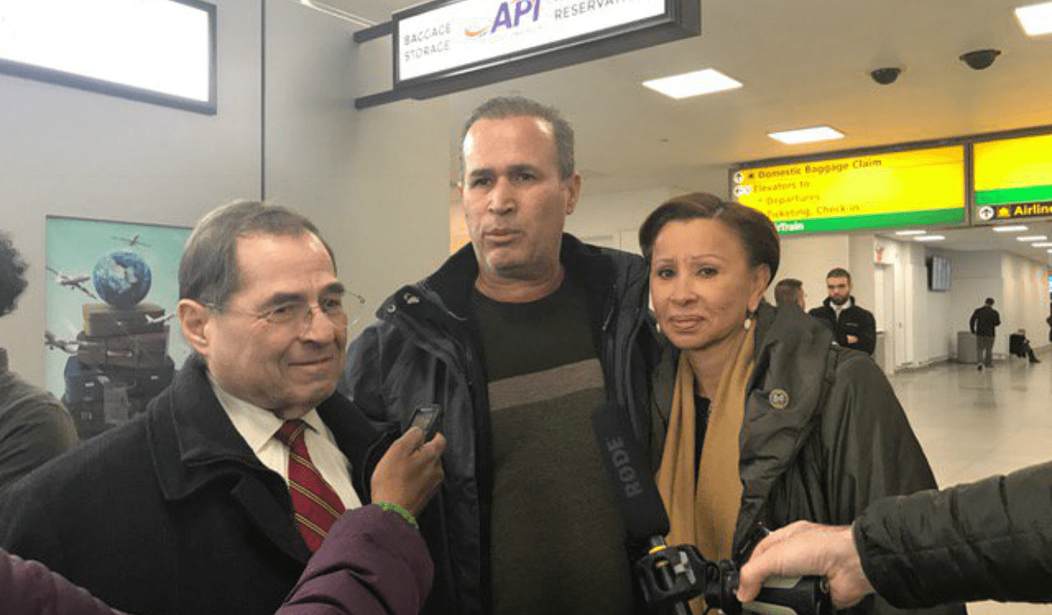President Donald Trump issued an order suspending entry for all refugees from countries of terror concern on Friday. After two Iraqi refugees — previously vetted by the State Department and the Department of Homeland Security — were detained due to Trump’s order Saturday morning, their lawyers filed two challenges to the order in court.
“Who is the person we need to talk to?” asked Mark Doss, a lawyer for one of the refugees and supervising attorney at the International Refugee Assistance Project, The New York Times reported. “Mr. President,” an unnamed Customs and Border Protection agent replied. “Call Mr. Trump.”
“We’ve never had an issue once one of our clients was at a port of entry in the United States,” Doss added. “To see people being detained indefinitely in the country that’s supposed to welcome them is a total shock.”
“These are people with valid visas and legitimate refugee claims who have already been determined by the State Department and the Department of Homeland Security to be admissible and to be allowed to enter the U.S. and now are being unlawfully detained,” the lawyer explained.
Trump’s order, which suspends entry for all refugees from Syria indefinitely, bars entry into the United States for 90 days from other countries with terrorism concerns. There countries are not listed but are believed to be Iran, Iraq, Libya, Somalia, Sudan, and Yemen. The order also suspended entry for all refugees for 120 days, creating a “legal limbo for people on their way to the United States and panic for families who were awaiting their arrival,” the Times explained.
While it is unclear how many refugees and immigrants were being held after the order, two complaints were filed on behalf of Iraqi refugees detained at Kennedy Airport in New York City. Lawyers reported that Hameed Khalid Darweesh, who had worked on behalf of the United States government in Iraq for 10 years, and Haider Sameer Abdulkhaleq Alshawi, who was coming to join his wife and son, were detained at the airport on Friday night after arriving on separate flights.
Their detentions prompted legal challenges. Lawyers representing Darweesh and Alshawi filed a writ of habeas corpus early Saturday in the Eastern District of New York, seeking the release of their clients. They also filed a motion for class certification, in an effort to represent all refugees and immigrants who report being unlawfully detained at ports of entry across the country.
The complaints were filed by the American Civil Liberties Union, the International Refugee Assistance Project at the Urban Justice Center, the National Immigration Law Center, Yale Law School’s Jerome N. Frank Legal Services Organization and the firm Kilpatrick Townsend & Stockton.
According to the filing, Darweesh was granted a special immigrant visa on January 20, the same day Trump was sworn in as president. Darweesh had worked as an interpreter for the U.S. Army’s 101st Airborne Division in Iraq and Mosul starting shortly after the beginning of the Iraq War on April 1, 2003. He was reportedly directly targeted twice for working with the U.S. military.
Darweesh was released on Saturday afternoon, according to a picture posted on Twitter by New York Congresswoman Nydia Velazquez.
One of the refugees, Hameed Khalid Darweesh, has been released pic.twitter.com/U1XHr4DaTt
— Rep. Nydia Velazquez (@NydiaVelazquez) January 28, 2017
The Times put “radical Islamic terrorists” in scare quotes, as though terrorism inspired by outspokenly Muslim terrorists such as the Islamic State (ISIS) is not more likely to come from countries such as Iraq and Syria.
There is a serious problem with illegal immigration from countries of terrorist concern — a report last year from the spokeswoman of the Department of Defense’s Southern Command (Southcom) revealed an estimate of 30,000 illegal immigrants have been smuggled across the southwestern border of the United States in 2015 alone.
Furthermore, at least one of the Paris bombers entered the country as a Syrian refugee. Further concern and vetting makes good sense, even though Darweesh and Alshawi are extremely unlikely to be threats themselves.
While Trump’s order blocking all refugees for 120 days while the Department of Homeland Security, the State Department, and the director of National Intelligence unanimously decide which countries’ refugees will be allowed in might make sense from a homeland security standpoint, it also leaves immigrants like Darweesh and Alshawi out in the cold, arguably with their rights violated.
Trump may be right to restrict the refugee count for 2017 to 50,000, as opposed to Obama’s 110,000 number. He may be right to restrict refugees from certain countries, and he might be right to give preferential treatment to Christian refugees. But those like Darweesh and Alshawi were almost certainly mistreated and denied their rights in this situation.









Join the conversation as a VIP Member